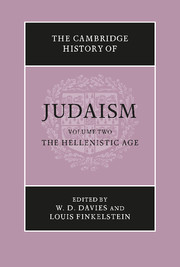Book contents
- Frontmatter
- 1 The archeology of Hellenistic Palestine
- 2 The political and social History of Palestine from Alexander to Antiochus III (333–187 B.C.E.)
- 3 Hebrew, Aramaic and Greek in the Hellenistic age
- 4 The Diaspora in the Hellenistic age
- 5 The interpenetration of Judaism and Hellenism in the pre-Maccabean period
- 6 The men of the Great Synagogue (circa 400–170 .b.c.e.)
- 7 Pharisaic leadership after the Great Synagogue (170 B.C.E.–135 C.E.)
- 8 Antiochus IV
- 9 The Hasmonean revolt and the Hasmonean dynasty
- 10 Jewish literature in Hebrew and Aramaic in the Greek era
- 11 Jewish–Greek literature of the Greek period
- 12 The Apocrypha and Pseudepigrapha of the Hellenistic period
- 13 The book of Daniel
- 14 The matrix of apocalyptic
- 15 The Septuagint and its Hebrew text
- 16 The Targumim
- 17 The Samaritans
- 18 The growth of anti-Judaism or the Greek attitude towards the Jews
- Bibliographies
- Chronological table
- Index
- References
18 - The growth of anti-Judaism or the Greek attitude towards the Jews
Published online by Cambridge University Press: 28 March 2008
- Frontmatter
- 1 The archeology of Hellenistic Palestine
- 2 The political and social History of Palestine from Alexander to Antiochus III (333–187 B.C.E.)
- 3 Hebrew, Aramaic and Greek in the Hellenistic age
- 4 The Diaspora in the Hellenistic age
- 5 The interpenetration of Judaism and Hellenism in the pre-Maccabean period
- 6 The men of the Great Synagogue (circa 400–170 .b.c.e.)
- 7 Pharisaic leadership after the Great Synagogue (170 B.C.E.–135 C.E.)
- 8 Antiochus IV
- 9 The Hasmonean revolt and the Hasmonean dynasty
- 10 Jewish literature in Hebrew and Aramaic in the Greek era
- 11 Jewish–Greek literature of the Greek period
- 12 The Apocrypha and Pseudepigrapha of the Hellenistic period
- 13 The book of Daniel
- 14 The matrix of apocalyptic
- 15 The Septuagint and its Hebrew text
- 16 The Targumim
- 17 The Samaritans
- 18 The growth of anti-Judaism or the Greek attitude towards the Jews
- Bibliographies
- Chronological table
- Index
- References
Summary
The first clear evidence of the Greeks beginning to notice the Jewish people, and the Jewish way of life, comes from the last two decades of the fourth century b.c.e. This new awareness was one of the direct results of the eastern world being thrown open to the enquiring spirit of the Greeks, in the wake of Alexander the Great's victorious expedition (Phoenicia and Syria were conquered in 332 b.c.e.). That huge expansion of human and geographical horizons prompted a new departure in Greek ethnographic studies, which had been enriched, since their first flowering in the period of colonial expansion, by developments in philosophical and theoretical thought. Cultural history, science and religion provided perspectives by which the endless mass of newly available fact could be accommodated in theories based on precise concepts, and judged by carefully formulated canons of interpretation. It is in this context that we should consider the awakening of interest in the Jews and their customs. To establish the chronological sequence in which the first Greek authors reflected and wrote about the Jews is difficult, if not impossible, not only because of our fragmentary knowledge of their works, and because our only clues come from brief excerpts, but also because it is difficult to date the works themselves with any precision. Besides, the need to establish such a chronological priority is obviated, or at any rate greatly diminished, when we consider that these first Greek authors wrote about the Jews quite independently of each other – a fact which seems fairly well established.
- Type
- Chapter
- Information
- The Cambridge History of Judaism , pp. 614 - 656Publisher: Cambridge University PressPrint publication year: 1990

